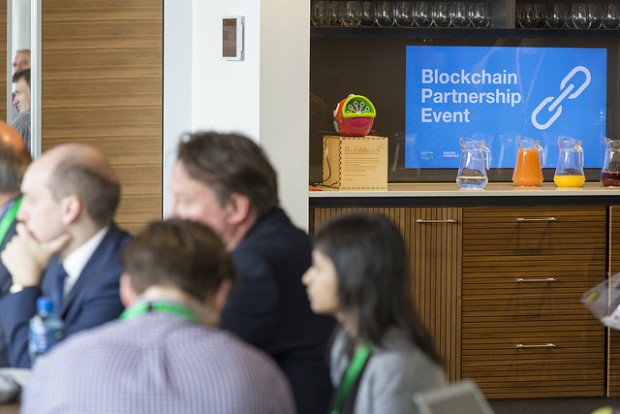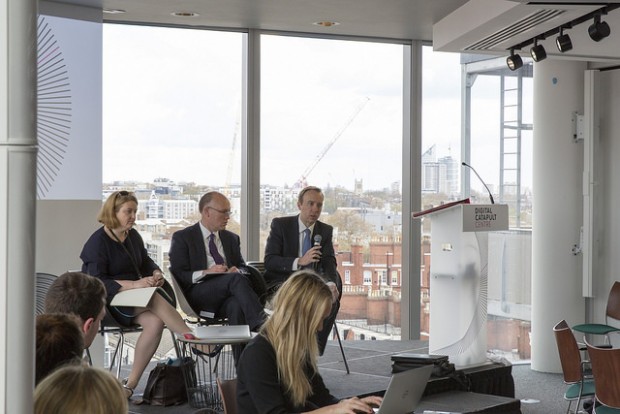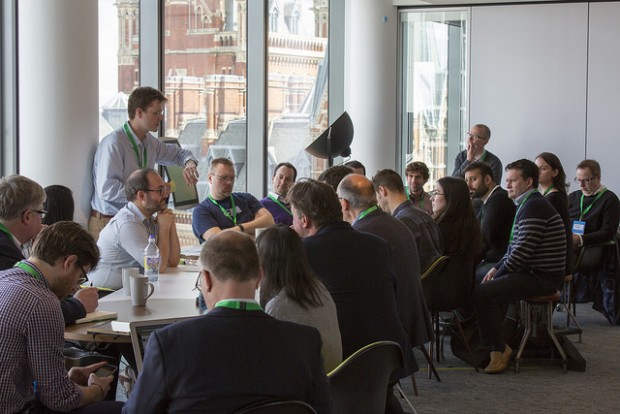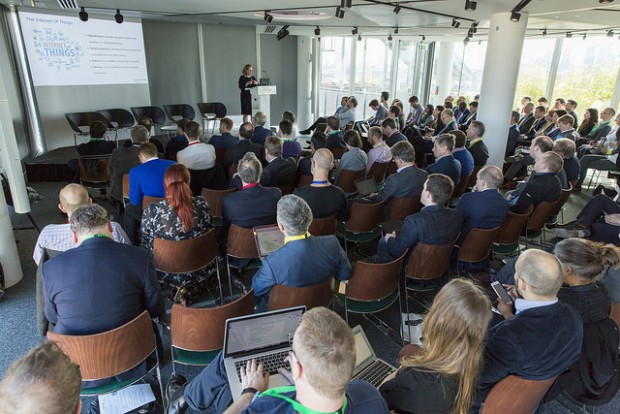
On 26 April, the British Government hosted its first blockchain partnership event. The event brought together industry, academia and government to talk about blockchain technology and how it could help improve citizens' lives.
The focus of the day was to identify and explore potential applications of blockchain, ranging from the tracking of products through a supply chain to providing a clear and accessible record of how public money is spent.
There was huge enthusiasm about blockchain technology and the potential it offers to deliver services in completely new ways. There was also a healthy understanding of where we should not use this technology - it’s not a silver bullet and in a number of circumstances we identified other technical solutions that would meet user needs.
Identity and security
A large proportion of discussion during the day focussed on the decentralised nature of distributed ledger technology and how personal data can be protected to remain tamper and fraud resistant, especially when discussing how blockchain could be used for storing personal data.
Would access to your own record require a DNA or retinal identifier for example? Or could a facebook profile provide sufficient verification?
Working in DFID doesn’t always afford you the chance to talk about microgrid solar energy start-ups in Brooklyn, the potential for local councils to operate as autonomous computer programmes, or with people who are seriously high-profile on Reddit. But the Government Digital Service’s ‘Blockchain Partnership’ workshop on 26 April gave me and colleagues from DFID a great opportunity – to hear from people with diverse perspectives and expertise on a new technology, and work with them to apply this to the challenges of extreme poverty.
Our group brainstormed how blockchain could help in international development – especially how it might help both refugees who may have lost identity papers, or the approximately 35% of people in the world without a birth certificate, to prove who they are in emergency situations, to access health services, receive educational qualifications or inherit property. The discussion ranged from domestic policies to international ones - if this innovation might make it easier to prove to a letting agent that I’m a responsible renter, could it also help a refugee assert their unique identity to UNHCR and receive services that they need? What different risks and opportunities to solve problems does this throw up?
Crucially, the diverse mix of people in the room led to diverse critiques of our ideas. Governments and international agencies should get only the information they need to provide crucial services, and people should be aware of and control how others access their data. The next step will be agreeing and leading on these design principles, and working with people on the ground to understand how we can harness some of the most futuristic technology in the world to solve some of our most pressing problems.
Olivia O’Sullivan, Department for International Development (DFID)
But there was also a recognition of the limitations of the technology and that there were circumstances where it probably wouldn’t be the best choice.
Blockchain technology is not going to solve every problem, or work in every context. When a trusted body already exists, for example, that can hold canonical data, that’s often the best solution.
Matthew Hancock MP, Minister for the Cabinet Office

Where is the user need?
We also questioned where and why blockchain might be used to add benefit to the user.
One team questioned if there was a value to creating a blockchain for new and used cars so all owners had access to a full service history while students from Imperial College's Centre for Cryptocurrency Research and Engineering (IC3RE) discussed the possibilities for protecting film rights.
The event showed an impressive willingness to engage with new technologies such as blockchains from a range of decision makers. Although the technology itself is still in its formative stages, the creative sessions provided solid concepts across a diverse range of topics, many of which were suitable for small scale R & D experimentation in the immediate future.
I hope to see the government capitalise by finding ways for the public and private sector to work together to come up with innovate proof of concepts utilising blockchains, doing away with outdated and inefficient bureaucracy in the process.
Alex Amsel, CTO Novus4

Where next?
Overall, the day really demonstrated the power of working together across boundaries to solve problems and explore new opportunities.
This type of event can sometimes be a bit of an echo chamber but the mix of attendees brought a different dimension to the discussion. A bunch of different use cases for blockchains were discussed, as well as the consequences and implications, some of which simply wouldn't occur to someone like myself from the private sector. For me, the next step would be to explore some of those ideas further, and ideally run some pilots or proofs of concept.
The format of the day itself - taking informed people from different backgrounds across both the public and private sectors - could be extended to exploring the impact that other emerging technologies could have on government and society at large.
Jack Gavigan, ZCash
In particular, InnovateUK's new competitions structure will allow startups and businesses to apply for funding to test ideas - maybe some of those discussed during the day will go forward as concepts.
The event got beyond the usual blockchain 101 type event and hand-wavey “we could put X on the blockchain” to a much more considered exploration of thought experiments around specific use cases.
It would be great to see some of those thought experiments and others like them developed and submitted as bids into the upcoming competitions run by Innovate UK. Blockchain is at a stage in its development where understanding the applications where it can really add value and generate economic growth is one of the key challenges, and funding from Innovate UK can help companies to take those first steps.
Keep an eye on the innovation grants for business webpage for the details of our competitions and if you have any questions don’t hesitate to get in touch.
Toby Proctor, Innovate UK
Thank you to everyone who participated in and helped to organise the day especially to Digital Catapult who hosted the event and IC3RE who facilitated the day and provided some fascinating case studies on how distributed ledger technology is being tested.
Yesterday was a great opportunity to bring individuals from all different areas of government, industry and academia together around the common interest of Blockchain technology. The enthusiasm from the attendees and the organisers was infectious and I think all left even more excited about the possibilities than before. I think a key takeaway from the day was both how broad the spectrum of applications of Blockchain can be but also how key collaboration will be in unlocking the true potential of the technology.
I hope that the government continues to foster growth in the area by being seen to support both development in the space but also look to lead by example and apply the technology themselves.
Andy Paine, IC3RE

To view the Flickr set of the day visit the GDS team flickr account
Keep the conversation going online - use #letstalkblockchain